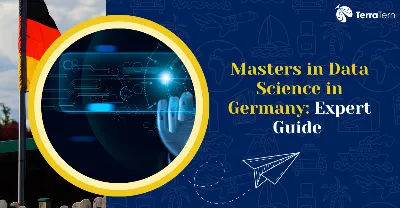Key Highlights
- Which Are the Latest Top Universities in Germany for Masters in Data Science?
- What Are the Current Benefits of Pursuing a Masters in Data Science in Germany in 2025?
- What Are the Eligibility Requirements for Masters in Data Science in Germany in 2025?
- How Much Does It Cost Currently to Study Masters in Data Science in Germany?
- What Scholarships in Germany Are Available for Indian Students in 2025?
- What Is the Step-by-Step Application Process for Masters in Data Science in Germany in 2025?
- How Do You Apply for a Current German Student Visa for a Master's in Data Science in Germany?
- What Is the Latest Course Curriculum and Program Structure for a Master's in Data Science in Germany?
- What Are the Current Career Prospects After Graduation?
- How Does Germany Compare to Other Study Destinations in the World?
- What Current Challenges Should You Be Prepared For While Studying a Master's in Data Science in Germany?
- What Are the Latest 2025 Trends in Data Science Education?
- Conclusion
Due to the quality education, low fees, and excellent career opportunities, an international student is finding it more attractive to pursue a Masters in data science in Germany, particularly (although not exclusively) among international students, predominantly Indians. Germany has more than 76 programs in English and a thriving tech sector that gives it the best atmosphere to pursue data science. It is very affordable at the public universities whose fees are only between 100 and 500 per semester. The best schools, such as TUM (#28 QS), RWTH Aachen (#54 QS), and Heidelberg (#84 QS), are the leaders in the field. Graduates have a salary of 50,000-60,000/year and an 18-month post-study work visa. Germany has a reduced number of IT specialists of 137,000, which provides excellent opportunities to skilled graduates in data science.
Which Are the Latest Top Universities in Germany for Masters in Data Science?

Germany boasts several internationally ranked top universities for a Master's in data science. The most popular universities and colleges are TUM (Technical University of Munich), RWTH Aachen University, and Heidelberg University, which have a high research orientation and collaboration with industries. The University of Hamburg, the University of Tübingen, and the University of Gothenburg offer special major courses in AI, big data, and analytics. Germany is a great place to become a data scientist due to low or no tuition in most public universities, English courses, and good employment statistics.
What Makes the Technical University of Munich (TUM) the Current Leading Choice?
TUM is one of the top universities in Germany for Master's in data science. It also attracts students worldwide because of its good reputation in research (Global ranking 28 QS).
Key Programs:
-
Mathematics in Data Science
-
Data analytics and Data engineering.
-
Data and Society
Highlights:
-
8% acceptance rate
-
Cooperation with BMW and Siemens.
-
Semester fee is €85
-
Location advantage is that Munich is the technological centre of Germany.
TUM focuses on practical education, business initiatives, and a well-developed alumni network.
How Does RWTH Aachen University Excel in Data Science Education in 2025?
RWWH Aachen is known to combine engineering and data science.
Programs Offered:
-
Data Science M.Sc. - Tuition-free, semester fee 300 Euro.
-
M.Sc. Data Analytics and Decision Science Full-tuition €30,000.
Module Highlights:
-
Advanced Machine Learning
-
Big Data Systems
-
Ethical AI
RWW Aachen is flexible and offers winter and summer intakes and good connections to the local innovation ecosystem.
What Are the Latest Advantages of Studying at the University of Hamburg?
The University of Hamburg belongs to the German Excellence Strategy.
Program: M.Sc. Data Science and Artificial Intelligence.
Curriculum Modules:
-
Statistical Data Analysis
-
Big Data Analytics
-
Ethics in Data Science
Key Points:
-
Semester Contribution: €335
-
Application Period: May 1 – June 15
-
High Employability: (#111 THE)
Hamburg is an academic institution that is interdisciplinary in nature.
Why Is the University of Tübingen Unique for Current Data Science Masters?
The most prominent hub of AI in Europe is Cyber Valley, located in Tübingen.
Specialised Programs:
-
Business and Economics Data Science.
-
Quantitative Data Science Processes.
Features:
-
An academic tradition of more than 500 years.
-
The possibilities of machine learning studies.
-
Non-EU student fee is €1,500 + semester fee of 166.80.
-
Deadlines for the application are May 15 and May 31.
Tübingen is practical and well-integrated with industry.
What Does the University of Göttingen Offer for Applied Data Science in 2025?
What does the University of Gottingen offer for a Master's in data science in Germany?
Specializations:
-
Computational Neuroscience
-
Bioinformatics
-
Medical Data Science
-
Digital Humanities
-
Computational Sustainability
-
Online Business Administration.
Application Process:
-
Online aptitude test- non-EU students.
-
Personal interview
-
Semester fee is €403.92. Gottingen emphasises practical projects and expert knowledge.
How Do the other Leading German Universities Compare?
The German universities are compared as follows:
|
University |
QS Rank |
Program |
Tuition |
Semester Fee |
|
Heidelberg University |
84 |
M.Sc. Data Science |
Free |
300 |
|
University of Mannheim |
112 |
Data Analytics |
Free |
350 |
|
University of Freiburg |
116 |
Data Science |
Free |
280 |
|
TU Dortmund |
150 |
Applied Data Science |
Free |
300 |
|
University of Potsdam |
174 |
Data Science |
Free |
310 |
|
Otto von Guericke Univ. Magdeburg |
201 |
Data and Analytics |
Free |
250 |
|
University of Hildesheim |
220 |
Data Science |
Free |
260 |
|
Leuphana Univ. Luneburg |
231 |
Data Science |
Free |
270 |
What Are the Current Benefits of Pursuing a Masters in Data Science in Germany in 2025?
Studying a Masters in data science in Germany benefits foreign scholars. German universities offer world-renowned education at low tuition costs, so the education is very affordable. Students can access higher research facilities, industries with global firms such as SAP, Siemens, and BMW, and hands-on experience through internships and projects. The 18-month work visa of the post-study period enables the graduates to acquire quality international experience in addition to the high rate of data professionals in Germany, which guarantees the graduates good employment opportunities. Germany is one of the most appropriate destinations to study data science because of its quality, affordability, and career prospects.
Also Read: Germany Visa for Education Recognition
Why Is Germany the Ideal Destination for Data Science Education in 2025?
Germany is ideal for data science studies due to its technology environment and solid industrial foundation.
Key Benefits:
-
The possibility of entering AI hubs such as Cyber Valley.
-
Introduction to Industry 4.0 and Smart Manufacturing.
-
Data scientists are in demand in finance, healthcare, and automotive.
-
Low tuition and high ROI.
The data science market projections in Germany have shown that it is set to increase by 22.5% in 2025 and provides many career opportunities.
How Does Germany's Latest Cost-Effectiveness Compare to Other Study Destinations?
Tuition comparison for Masters in data science in Germany:
Germany (Public Universities): none-€500/semester.
-
US: $30,000–$60,000/year
-
UK: £15,000–£30,000/year
-
Canada: CAD 20,000–40,000/year
-
Living Expenses: €800–€1,100/month
-
Accommodation: €350–€500
-
Food: €150–€200
-
Health Insurance: €110
-
Transport: €60–€80
-
Miscellaneous: €100–€150
The combination of quality and cheapness is found in Germany.
What Current Career Advantages Do German Data Science Graduates Have?
Graduates from Masters in data science in Germany benefit from:
-
SAP, Siemens, BMW, Mercedes-Benz, Deutsche Bank Industry relationships.
-
18-month post-study work visa
-
Permanent residence EU Blue Card.
Average Salary:
-
Entry-Level: €50,000–€60,000
-
Mid-Level (3–5 Years): €63,000–€79,000
-
Senior (5–10 Years): €79,000–€95,000
German certificates are accepted globally, increasing opportunities for working internationally.
What Are the Eligibility Requirements for Masters in Data Science in Germany in 2025?
The requirements to apply to a Masters in data science in Germany are a bachelor's degree in computer science, mathematics, statistics, engineering, or a similar area, and a minimum of 180 ECTS credits or equivalent. Most universities have a minimum GPA of 2.7 on the German scale (approximately 67%) and strong backgrounds in quantitative courses. Fluency in English is required- IELTS (6.57.0) or TOEFL (90100 iBT) is acceptable. Although GRE or GMAT scores are typically optional, they may make the application stronger. They also require applicants to possess technical skills in programming languages like Python, R, or SQL, together with statistics and fundamental knowledge of machine learning. Some universities may request a statement of purpose (SOP), letters of recommendation (LORs), and a resume of pertinent coursework or experience.
What Latest Academic Qualifications Do You Need?
What academic qualifications are needed for Masters in data science in Germany?
-
Minimum: 180 ECTS of a bachelor's degree.
-
Major: CS, Mathematics, Statistics, Engineering.
-
GPA: 2.7 German scale (~67%)
-
Quantitative Courses: 60 ECTS of Data Science/Math.
What Current English Language Proficiency Scores Are Required?
What English proficiency scores are required for Masters in data science in Germany?
-
IELTS: 6.5–7.0
-
TOEFL: 90–100+ iBT
-
Alternatives Accepted: Cambridge C1 or Duolingo.
Not compulsory, but suggested in Germany.
Are GRE or GMAT Scores Mandatory in 2025?
Are GRE or GMAT scores mandatory for Masters in data science in Germany?
-
Generally not required
-
The profile can be enhanced with an optional GRE 320+ or GMAT 650+.
What Latest Programming and Technical Skills Are Expected?
What programming and technical skills are expected for Masters in data science in Germany?
-
Programming like Python, R, SQL
-
Statistics and the foundation of mathematics.
-
Machine learning basics
-
Database knowledge
How Much Does It Cost Currently to Study Masters in Data Science in Germany?

The price of a Masters in data science in Germany is very low compared to the prices in other countries. Many universities in the public sector are free. They are only required to pay a small semester fee of between 100 and 350 Euros, and in Baden-Württemberg, students outside the EU can pay approximately 1500 Euros per semester. The cost of the private universities can, however, be between 10,000 and 30,000. The standard of living is between 850 and 1200 euros per month, which includes living in a rented apartment, food, transportation, and insurance. Overall, Germany is an affordable option for quality education because international students pay approximately 12-18000 yearly in a public university and 20-45000 in a private one.
What Are the Tuition Fees at Public vs. Private Universities in 2025?
What are the tuition fees for Masters in data science in Germany?
-
Public Universities: Free to €0.500/semester (comprising administration, student assistance, and transportation)
-
Private Universities: €13,000–€30,000/year
What Is the Latest Cost of Living in Germany for International Students?
What is the cost of living for students pursuing Masters in data science in Germany?
-
Accommodation: €350–€500
-
Food: €150–€200
-
Health Insurance: €110
-
Transport: €60–€80
-
Miscellaneous: €100–€150
What Are the Current Pre-Arrival Costs Indian Students Should Budget?
What is the pre-arrival cost for Masters in data science in Germany?
-
Application Fees: 30-150/university.
-
IELTS/TOEFL: €180–€250
-
Visa Fee: €75
-
Blocked Account: €11,208
-
Flight Tickets: INR 40,000–60,000
What Scholarships in Germany Are Available for Indian Students in 2025?
Several scholarships in Germany assist Indian students in obtaining a master's in data science. The most popular one is the DAAD Scholarship, which is approximately 934 per month, and travel and insurance cover for the host students. The Heinrich Boll Foundation Scholarship offers similar funds based on good academic and social activity. Deutschlandstipendum gives high-performance students a scholarship of 300 euros monthly through partner Universities. They need to show academic superiority, related experience, and drive, and submit the application early with the help of official websites such as DAAD or university websites.
Also Read: Germany Researcher Visa
How Can You Apply for the Latest DAAD Scholarships?
How to apply for DAAD scholarships?
-
Courses: Development-Related Postgraduate Courses, EPOS.
-
Eligibility: 2 + years of experience in some programs.
-
Benefits: Health insurance + travel allowance + €992/month.
What Current Other Scholarships Should Indian Students Consider?
What other scholarships can be considered?
-
Heinrich Boll Foundation is 934/month.
-
Konrad-Adenauer-Stiftung, including health insurance, payment of the fee: €934/month.
-
Friedrich Ebert Foundation
-
Erasmus+ mobility grants
-
Das Deutschlandstipendium ist 300 €/Monat.
What Is the Step-by-Step Application Process for Masters in Data Science in Germany in 2025?
What is the step-by-step application process?
-
Sift through universities regarding curriculum, specialisation, cost, and location.
-
Make paperwork like transcripts, degree certificates, CV, SOP, LORs, and language certificates.
-
Via Uni-Assist or the university portal.
-
Follow deadlines of winter/summer intakes (March- July winter and October- January summer).
How Do You Choose the Latest Right University and Program?
The most effective way to select the most appropriate university to pursue a master's in data science in Germany is based on the program's curriculum, fields of specialisation, research, faculty, industry networking, location, and price. Whittle down 6-8 universities and make a spreadsheet for comparison. Refer to such sources as the DAAD database and official university websites.
What Current Documents Are Required for Application?
The usual requirements include certified academic credentials, degree certificates, CV/resume, Statement of Purpose (1–2 pages), 2-3 Letters of Recommendation, language proficiency evidence (IELTS/TOEFL), and a copy of a passport and motivation letter, where necessary. Make sure that translations and notarizations are made.
Should You Apply Through Uni-Assist or University Portal in 2025?
In most public universities, document verification is done by Uni-Assist (for €75 first and an additional 30), which takes 6-8 weeks. In other universities, direct applications are permissible via portals. Verify the process of choosing and applying to each university.
What Are the Latest Application Deadlines for 2025-26 Intake?
Winter semester (central intake) is March- July; summer semester (limited programs) is October- January. The deadlines differ depending on the university (TUM, RWTH Aachen, Hamburg, Tuebingen, Gogh). Use 8-10 months before the start of the program among the international students.
How Do You Apply for a Current German Student Visa for a Master's in Data Science in Germany?
Indian students require a national D visa (Student Visa). You must submit your application to the German embassy or the VFS centre using your admission letter, proof of a blocked account of 11,208 (2025), health insurance, passport, and additional documents. The time to process is 6-10 weeks; once this is done, turn it into a residence permit.
Also Read: Germany Work Visa
What Type of Visa Do Indian Students Need in 2025?
What type of visa do Indians need to pursue Masters in data science in Germany?
-
Student Visa ( Visum zu Studienzwecken ) is for students who have already been accepted.
-
Potential student visa (Visum zur Studienbewerbung) for the applicants.
What Is the Latest Blocked Account Requirement?
What is the blocked account requirement under the Master's in Data Science in Germany?
-
Required Proof: €11,208
-
Providers: Fintiba, Expatrio, Deutsche Bank.
What Current Documents Are Needed for Visa Application?
To apply for a German student visa to pursue a Masters in data science in Germany, you will require the following:
-
Original passport (not counterfeit, no expired versions, 10 years old)
-
Admission letter of the university.
-
Confirmation of blocked account (€11208 to 2025)
-
Health insurance certificate (minimum coverage 30,000 Euros)
-
Biometric passport photos
-
Finalised the Visa application form.
-
Student transcripts and diplomas.
-
Language qualifications (IELTS/TOEFL or other similar)
How Long Does the Visa Process Take in 2025?
How long does the visa process take?
-
Typical timeline is 6–10 weeks.
-
Apply in VFS Global centres (Delhi, Mumbai, Bangalore, Chennai, Kolkata, Pune).
What Is the Latest Course Curriculum and Program Structure for a Master's in Data Science in Germany?

In Germany, a master's in data science is usually a 2-year program, consisting of basic theory, specialisations, and practice. Year 1 deals with foundations such as statistics, machine learning, big data, programming (Python, R, SQL), data mining, and mathematics. Year 2 aims at the advanced electives, including deep learning, NLP, computer vision, business analytics, AI ethics, and cloud computing. There is also a master's thesis, internships, capstone projects, and practical lab work that the students do to ensure they are well-equipped in theory and industry skills.
What Current Core Subjects Are Covered in Year 1?
What core subjects are covered under Masters in data science in Germany?
-
Statistics for Data Science
-
Introduction to Machine Learning.
-
Big Data Systems
-
Database Management
-
Programming (Python, R, SQL)
-
Data Mining & Visualisation
-
Mathematical Foundations
-
Research Methods
What Specialisation Options Are Available in Year 2 in 2025?
What specialisations are there under the Master's in data science in Germany?
-
Neural Networks and Deep Learning.
-
NLP & Computer Vision
-
Data Engineering at Scale
-
Business Analytics
-
AI Ethics & Fairness
-
Reinforcement Learning
-
Time Series Analysis
-
Cloud Computing
What Are the Latest Thesis and Practical Components?
What are the thesis and practical components of a Master's in data science in Germany?
-
Thesis: 6 months, 30 ECTS, commonly industry-sponsored.
-
Internships: Optional/mandatory
Siemens, SAP, BMW, Capstone projects, and lab work.
What Are the Current Career Prospects After Graduation?
A Masters in data science in Germany has excellent technological, finance, medical, and consulting career opportunities. First-level wages are between €50,000 and 60,000, with the higher levels up to mid-level of 79,000 and senior levels up to 95,000. The key recruiters are Siemens, Mercedes-Benz, BMW, Deutsche Bank, SAP, and Amazon Germany. The 18-month post-study work visa allows international students to acquire professional experience and eligibility for the EU Blue Card, which opens the doors to permanent residency and the ability to migrate into the workforce worldwide.
What Is the Average Salary for Data Scientists in Germany in 2025?
What is the average salary for Masters in data science in Germany?
-
Entry-Level: €50,000–€60,000
-
Mid-Level: €63,000–€79,000
-
Senior: €79,000–€95,000
-
Expert: €95,000–€127,000
Which Companies Hire Data Science Graduates in Germany?
Which companies hire graduates with a Master's in data science in Germany?
-
SAP, Siemens, BMW, Mercedes-Benz, Deutsche Bank
-
Berlin Startups, Munich Startups, Hamburg Startups.
-
Occupations: Data Scientist, Data engineer, machine learning engineer, Business Intelligence Analyst.
What Is the Current 18-Month Post-Study Work Visa?
What is the 18-month post-study work visa?
-
Job Search: 18-month job search visa
-
EU Blue Card Qualification: Minimum salary is 45,300.
-
Permanent Residence: 21–33 months
How Does German Work Experience Benefit International Careers in 2025?
It is gratifying to acquire work experience in Germany after completing a master's in data science, hence working globally. German degrees and work experience are accepted worldwide, making them more employable in the EU, the US, and India. The multilingual work environment, high level of tech infrastructure, and networking opportunities speed up the process of skills acquisition, and the EU Blue Card enables international mobility and career development in the long run.
How Does Germany Compare to Other Study Destinations in the World?
Germany has one of the best Masters in data science that has world-class education, cheap tuition, and good employment opportunities. It has tuition-free public higher education and 2-year courses, as well as an 18-month post-study visa, compared to high tuition and a short optional time in the USA. Germany is cheaper than the UK, has more extensive courses, and a definite EU Blue Card route. It has more affordable tuition and closer ties to the industry than Canada, with easier immigration and a higher cost of living. Germany, in general, is a compromise between quality, price, and global employment.
Germany vs. USA for Data Science Masters
Germany has affordable and quality education when tuition is free in state-owned universities (€0350/semester) and 18 months post-study employment (vs. the US at $30,00060,000/year) when admission is competitive, and the post-study employment option is limited. In Germany, 2 years are the norm compared to 1.5-2 years in the US, with a quicker ROI and less difficulty obtaining permanent residency with the help of the EU Blue Card.
Germany vs. the UK for a Master's in Data Science
German education is cheaper than the UK ( £15,000730,000/ year ), with a 2-year course and an 18-month post-study work permit. The UK is easier with a 1-year and 2-year PSW visa after Brexit, but with an increased total price. Germany offers more balanced tuition, living expenses, career, and residence.
Germany vs. Canada for Data Science Education
In Germany, the tuition is less, and there is a good network with industries, whereas Canada has Express Entry to allow immigrants to have good policies. The post-study work visa of 18 months and the EU Blue Card route enable career establishments to be achieved in less time in Germany, compared to Canada, where PR has a longer route. Germany has advantages in ROI, technology exposure, European career, living costs, climate, and job markets.
What Current Challenges Should You Be Prepared For While Studying a Master's in Data Science in Germany?

There are highs and lows in studying for a master in Data Science in Germany, such as working out a new academic culture, housing in a competitive student market, and language. Although the use of English-taught programs is regular, studying German (A1–B1) as related to employment and everyday activities is strongly advisable. Pre-arranged accommodation, learning teaching styles, and cultural adaptation strategies enable the students to overcome these obstacles efficiently.
How Important Is Learning German in 2025?
How important is learning German?
-
Mandatory (but not obligatory), but necessary to work (70% need German)
-
Start with A1-B1, aim for B2-C1
What Are the Latest Housing Challenges in German University Cities?
What are the housing challenges faced in pursuing a master's in Data Science in Germany?
-
In a competitive market, start the search 46 months in advance.
-
Prices: Studentenwerk (dorms), WG apartments, private studio.
How Do You Adapt to Current German Academic Culture?
How to adapt to the German academic culture?
-
Research-oriented independent learning.
-
Formal communication and Punctuality.
What Are the Latest 2025 Trends in Data Science Education?
The Master of Data Science in Germany is quickly changing to meet the industry needs in 2025. The most important are Generative AI to create synthetic data, AutoML to build simpler models, NLP to develop applications based on languages, and Edge Computing and IoT to provide real-time analytics. Such emerging fields as Quantum Computing, Ethics and Explainability in AI, Data Governance, and Cloud-Native Technologies also attract attention. Such tendencies focus on workable talents, accountable AI behavior, and correspondence with the demands of the world industry.
Also Read: Germany Opportunity Card
How Is AI Integration Changing Data Science Curricula in 2025?
How is AI changing the science curriculum?
-
GenAI modules, LLM applications, ethical AI, ChatGPT devices.
-
Focus on applied AI competencies.
What Latest Industry 4.0 Skills Are German Programs Emphasising?
The Industry 4.0 skills that German programs are emphasising are IoT analytics, smart cars, and intelligent production.
How Are Current Sustainability and Green Tech Integrated?
Green technology and sustainability are integrated in climate analytics, ESG analytics, and renewable energy optimisation.
Conclusion
Earning a Masters in data science in Germany is affordable, and it offers career opportunities coupled with a world-class education. The reason is that it is free of tuition in publicly funded universities, offers an 18-month work visa after the study, and has a great tech ecosystem in Germany.
TUM, RWTH Aachen, Hamburg, and Tuebingen offer practice-based and theory-based excellence. The EU Blue Card grants graduates access to the leading companies, a global reputation, and a definite way to permanent residence. Germany has well-prepared data science graduates with the introduction of AI, Industry 4.0, and sustainability.
Contact TerraTern for more information in Masters in data science in Germany.
"Master Data Science in Germany: Your Ultimate Guide to Top Universities, Costs, and Career Prospects in 2025"








